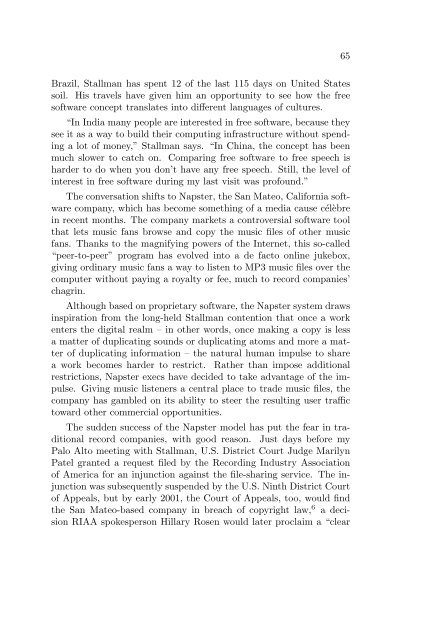Create successful ePaper yourself
Turn your PDF publications into a flip-book with our unique Google optimized e-Paper software.
Brazil, Stallman has spent 12 of the last 115 days on United States<br />
soil. His travels have given him an opportunity to see how the free<br />
software concept translates into different languages of cultures.<br />
“In India many people are interested in free software, because they<br />
see it as a way to build their computing infrastructure without spending<br />
a lot of money,” Stallman says. “In China, the concept has been<br />
much slower to catch on. Comparing free software to free speech is<br />
harder to do when you don’t have any free speech. Still, the level of<br />
interest in free software during my last visit was profound.”<br />
The conversation shifts to Napster, the San Mateo, California software<br />
company, which has become something of a media cause célèbre<br />
in recent months. The company markets a controversial software tool<br />
that lets music fans browse and copy the music files of other music<br />
fans. Thanks to the magnifying powers of the Internet, this so-called<br />
“peer-to-peer” program has evolved into a de facto online jukebox,<br />
giving ordinary music fans a way to listen to MP3 music files over the<br />
computer without paying a royalty or fee, much to record companies’<br />
chagrin.<br />
Although based on proprietary software, the Napster system draws<br />
inspiration from the long-held Stallman contention that once a work<br />
enters the digital realm – in other words, once making a copy is less<br />
a matter of duplicating sounds or duplicating atoms and more a matter<br />
of duplicating information – the natural human impulse to share<br />
a work becomes harder to restrict. Rather than impose additional<br />
restrictions, Napster execs have decided to take advantage of the impulse.<br />
Giving music listeners a central place to trade music files, the<br />
company has gambled on its ability to steer the resulting user traffic<br />
toward other commercial opportunities.<br />
The sudden success of the Napster model has put the fear in traditional<br />
record companies, with good reason. Just days before my<br />
Palo Alto meeting with Stallman, U.S. District Court Judge Marilyn<br />
Patel granted a request filed by the Recording Industry Association<br />
of America for an injunction against the file-sharing service. The injunction<br />
was subsequently suspended by the U.S. Ninth District Court<br />
of Appeals, but by early 2001, the Court of Appeals, too, would find<br />
the San Mateo-based company in breach of copyright law, 6 a decision<br />
RIAA spokesperson Hillary Rosen would later proclaim a “clear<br />
65


